What Ever Happened to GeoCities?
In the mid 1990s, the internet had no Facebook, Google or even Wikipedia. If you wanted to use the web to promote your business, share important local information with the rest of the world, or even tell your friends about your recent adventures, you'd need to create your own website.
Most people could learn the basics of HTML coding within a few hours, and starting around 1994, others could use WYSIWYG (what-you-see-is-what-you-get) apps like Adobe PageMill. At one point, even web browsers came bundled with basic website creation tools.
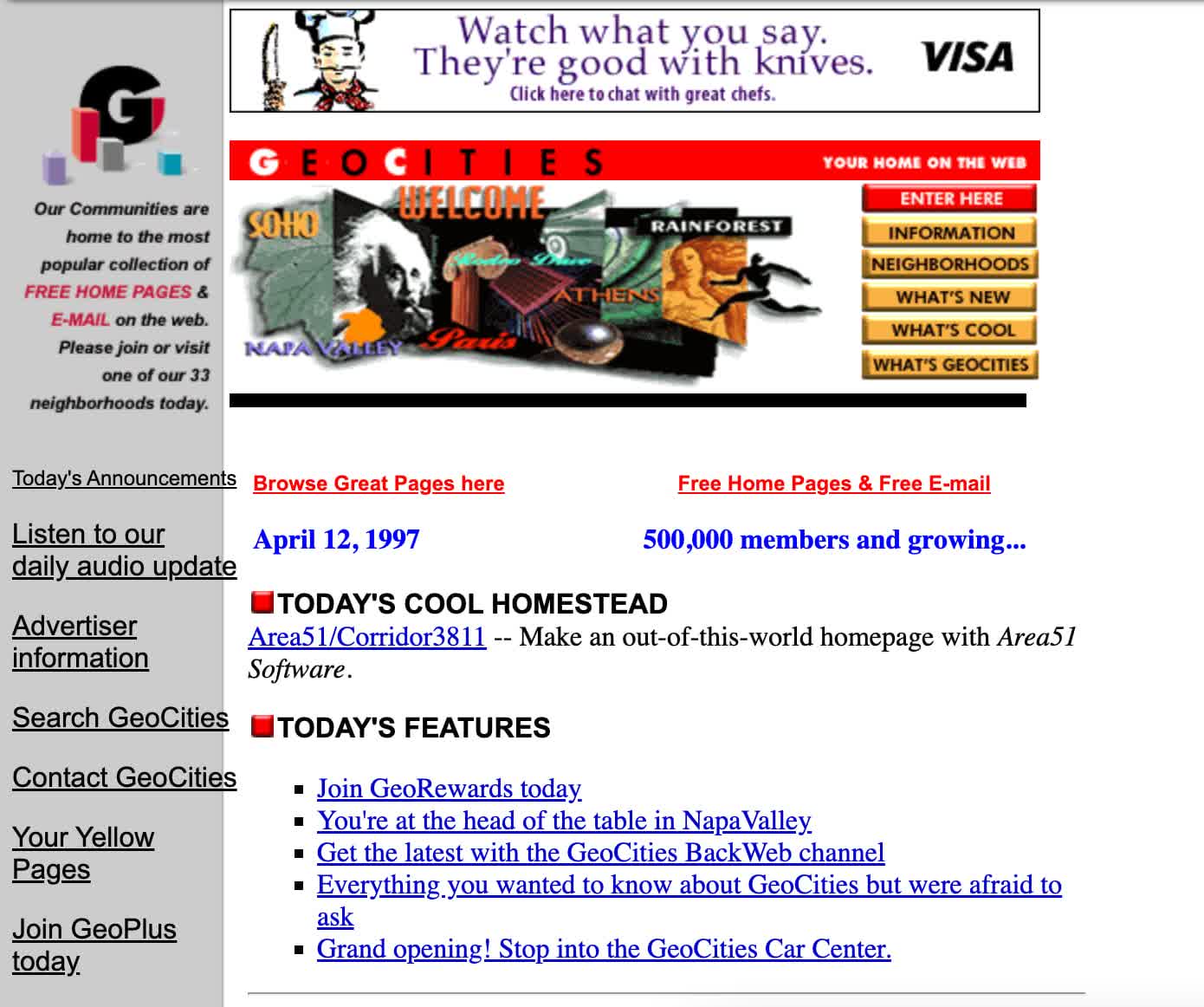
But then the problem was hosting your site online. Servers cost money (especially back then) and not everyone wanted to pay for that service, or could pay for it, if they were teenagers or college students. Enter GeoCities, which started offering a free hosting plan in 1995.
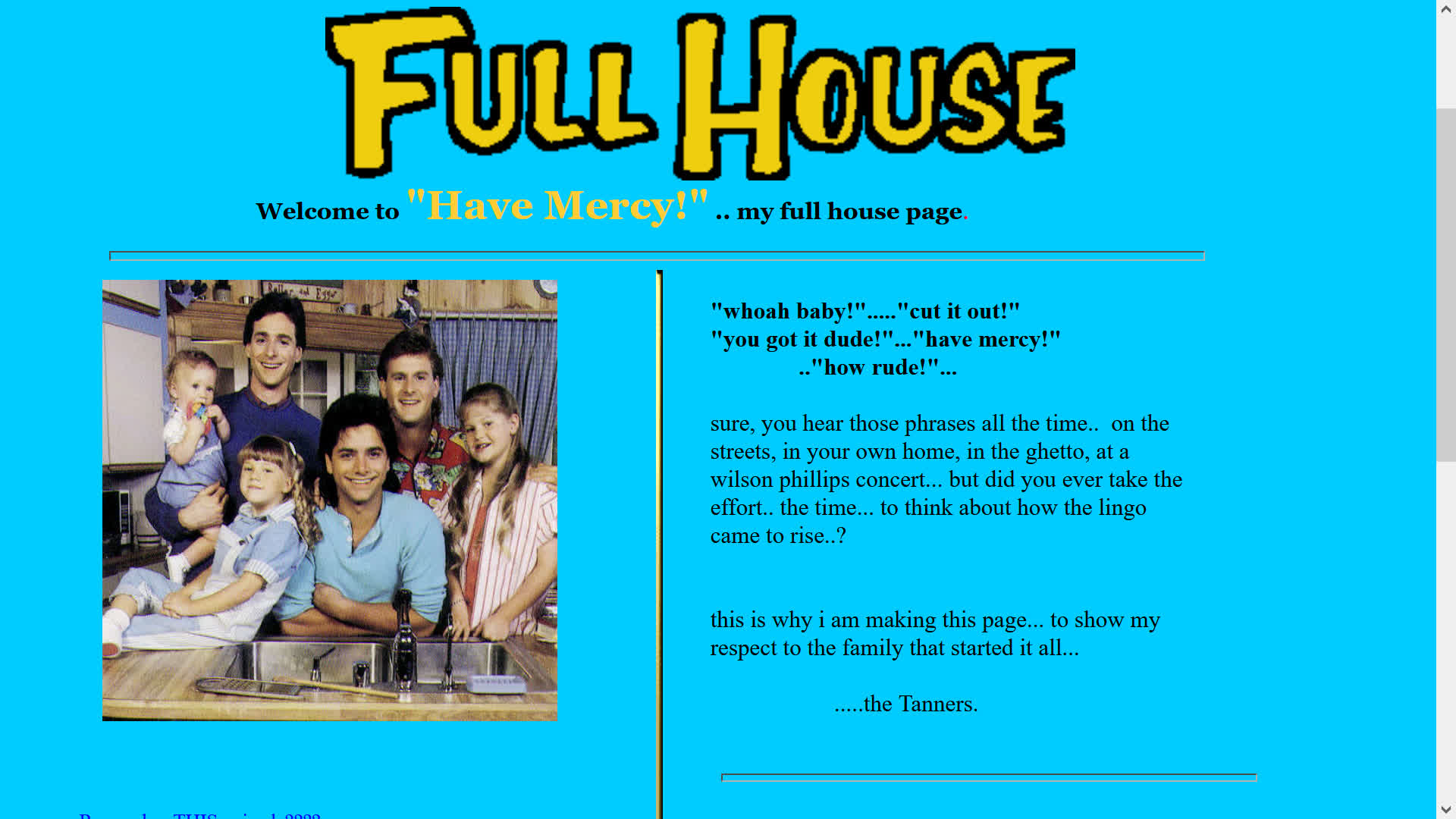
GeoCities was more than just a hosting service, however: with community-oriented features and tools to make the creation of websites easier, it could be seen as the forefather of social media. In 1999, the site was the third-most popular on the web.
At the peak of its popularity, GeoCities was sold to Yahoo!, which drove it away from its social origins, making it irrelevant in the Web 2.0 era. A decade later, it was shut down everywhere outside of Japan. This is the story of an internet that was very different from that of today.

Won't You Be My Neighbor?
GeoCities was started in late 1994 by David Bohnett and John Rezner as just another web-hosting service called Beverly Hills Internet. In June of the following year it started offering a free plan with a generous 2MB of storage space to users, but that was only the beginning.
Users, which were called "homesteaders," were asked to choose a "neighborhood" such as Capitol Hill ("government, politics and lots of strong opinions"), Hollywood ("film and TV") or Paris ("romance, poetry, the arts") upon registration. Neighborhoods, as well as "suburbs" to existing neighborhoods, were added as the site kept growing.
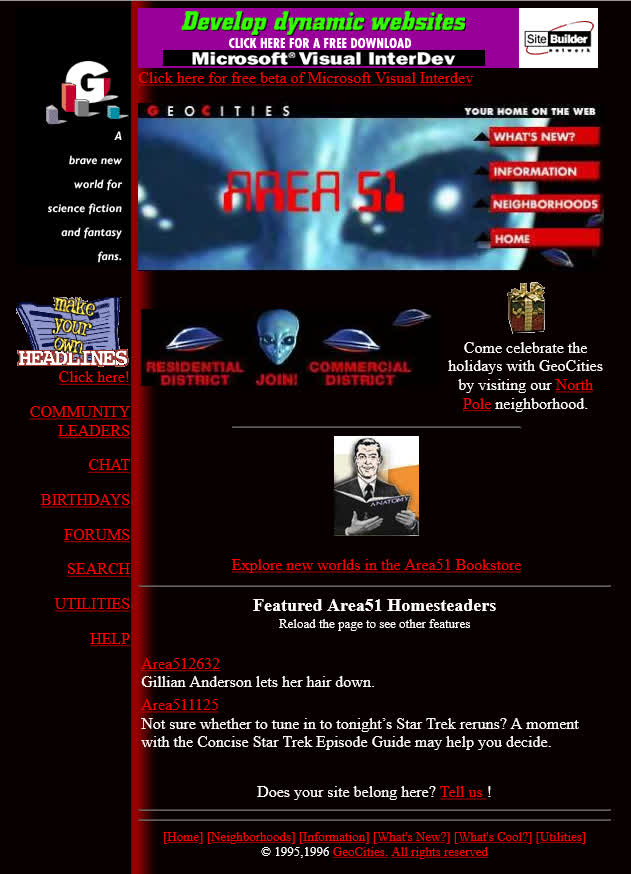
Every neighborhood had its own forum, live chat, and even list of all of the homesteaders that celebrated their birthday each day. The default URL of each site included the name of the neighborhood, and a number, referred to as a "street address."
Homesteaders could either use the site's Basic Home Page Editor to create their site automatically, or upload HTML files, GIF or JPEG images and more. By December 1995, the site had more than 20,000 homesteaders and more than 6 million pageviews per month, when it changed its name to GeoCities.
The success of GeoCities encouraged the appearance of copycat services and website builders. One of those sites called FortuneCity was TechSpot's first home in 1998.
All 'Bout the Money
In 1997, GeoCities started showing pop-up advertisements on its free sites. While annoying to visitors, at least they didn't interfere with the existing designs of websites. The same couldn't be said about the transparent watermark linking to the main site introduced the following year, which would stay at the bottom-right corner of the screen at all times, angering many of the site's 2 million users.
In 1998, the company received $25 million from Japanese holding company SoftBank, and $5 million from Yahoo!. Later that year, it was listed in the Nasdaq stock exchange. The stock launch price was $17, which quickly surpassed the $100 mark as part of the dot-com bubble. The only problem was, the company was still losing money – at the tune of $8 million in the last quarter of 1998, to be more specific.
In 1999, GeoCities was the third-most visited site on the web, and sold to Yahoo! for $3.57 billion in stock, changing its name to Yahoo! Geocities. At first, Yahoo!'s terms of service stated that Yahoo! owned all of the content and rights of GeoCities websites, but that was quickly changed following negative media attention.
Later in 1999, Yahoo! took a step away from the neighborhood-based nature of the site by switching to site URLs based on the user's registration name. By the end of the year 2000, the original neighborhood names were no longer used within the main site either. Those were steps in the opposite direction of where the internet was heading, with groups based on shared interests.
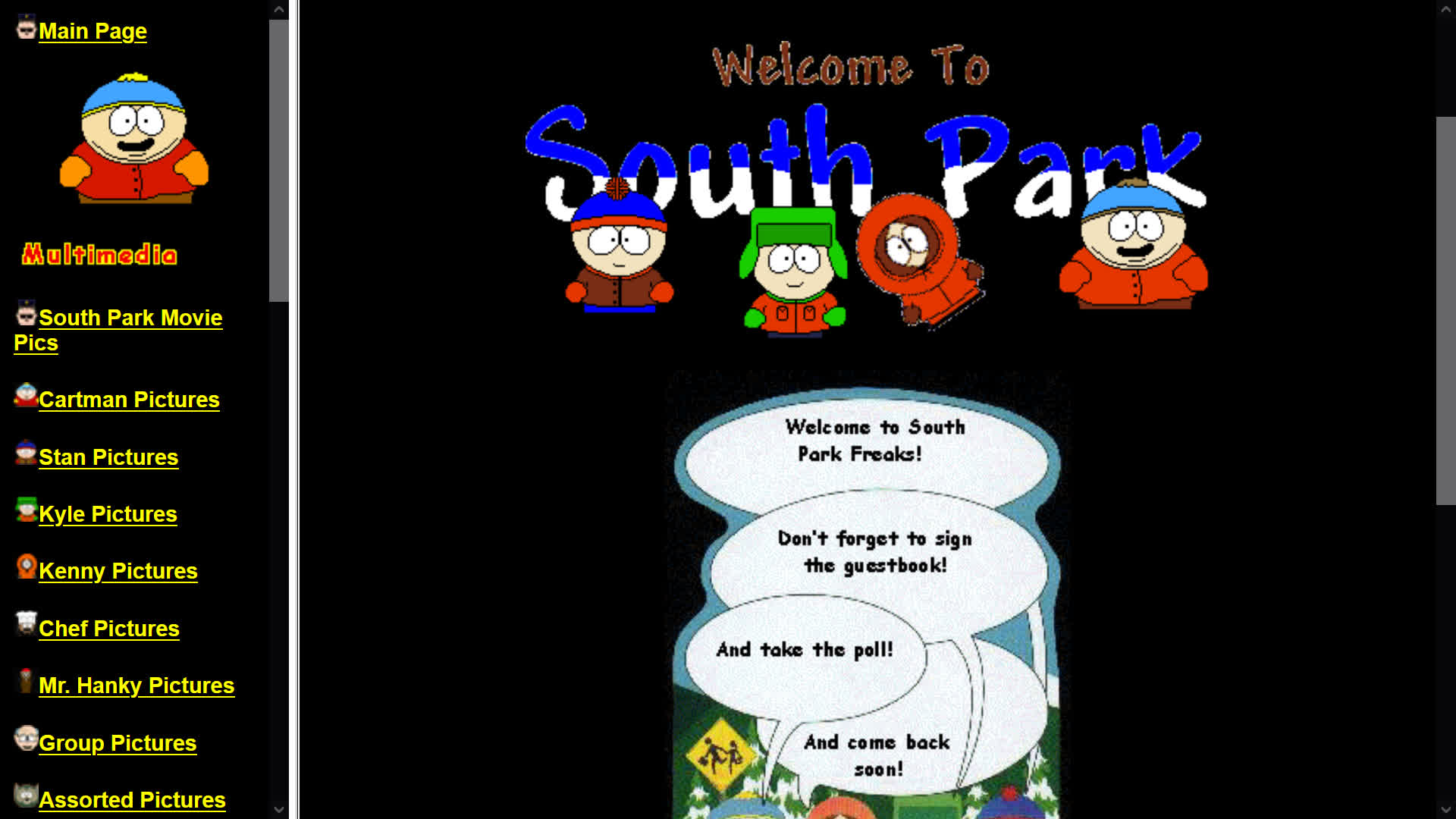
In 2001, Yahoo! introduced premium plans, and imposed a data transfer limit of 4.2MB per hour on free accounts, making it impossible to reach a large audience for free, especially for graphically rich sites. By then, Blogger and Wikipedia were already around.
Myspace, Facebook and Flickr later joined the Web 2.0 revolution, each bringing more reasons not to create or have a personal website. In addition, WordPress launched in 2003, making the site creation and management tools of GeoCities look outdated.
Big in Japan
In April 2009, Yahoo! announced that it would shut down GeoCities in October of that same year, deleting the sites of everyone who hadn't migrated to the paid Yahoo! Web Hosting service, and stopped accepting new members. The only exception was GeoCities Japan, part of Yahoo! Japan, which was a joint venture between SoftBank and Yahoo!
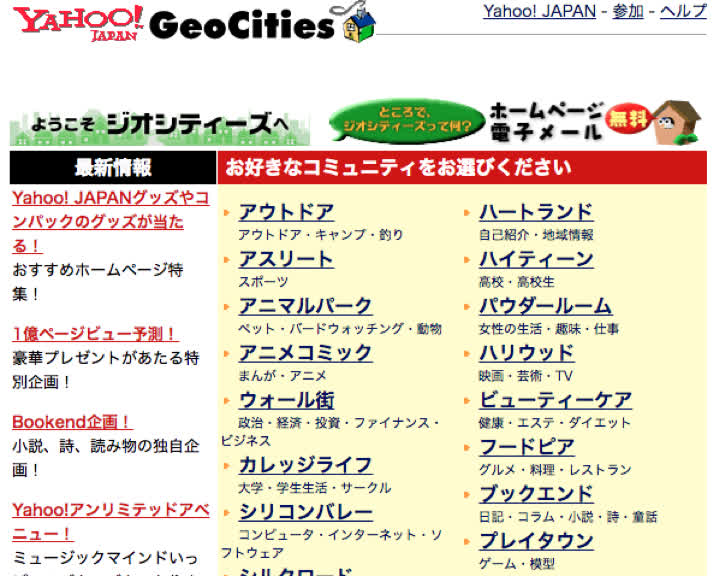
GeoCities Japan remained alive for a decade longer than the main site.
Following the announcement, the Internet Archive launched a project to save as many of GeoCities' 38 million pages as possible. The unrelated Archive Team was also established in response to Yahoo!'s actions, and has since contributed to the preservation of content from several once-popular sites.
In October 2018, Yahoo! Japan, which was no longer related to Yahoo!, announced that GeoCities Japan would finally be terminated in March 2019. The Archive Team then started a new project to preserve the site.
Journey to the Past
If you want to browse old GeoCities sites like you could in the era before the Yahoo! acquisition, based on neighborhoods and suburbs, you should visit Restorativland's GeoCities Gallery.

The SiliconValley neighborhood on the GeoCities Gallery.
If you want to search for a more specific term, you should try GeoCities.ws, a spiritual successor to GeoCities that's completely unrelated to the original company, with a quick-loading archive of GeoCities. The site offers a free hosting service plan under the name "homesteader."
The most thorough archive of old GeoCities sites can be found on OoCities. The site's search function includes results from GeoCities.ws, and you can also search for a site by username, or by neighborhood and "street address."
...
Clearly, GeoCities earned its place in web history.
Discussion topic for the comments: if you were around back in the 1990s, did you have your own website? Or when was the first time you had some presence online?
文章
3
浏览
2
获赞
6
热门推荐
Twitter's audio tweets reveal a bigger accessibility problem
Twitter started rolling out a brand new featureearlier this week that allowed iOS users to share recThe best Cyber Monday Vitamix blender deals
Cyber Monday blender deals are rolling out, and Amazon's blessed us with nearly every single VitamixTikTok's most
We've watched a lot of TikTok this year. According to the screen time report on my phone, I've spentTesla demands access to VIN
The cost of Full Self-Driving just got a little steeper. But unlike past price hikes, this time drivEncrypted Signal app downloads skyrocket amidst nationwide protests
When the police state comes knocking, a little bit of privacy goes a long way. As peaceful protesterTikTok Wrapped 2023: How to download your TikTok data to try it for yourself
Move over, Spotify Wrapped. You can get all your TikTok stats and data from 2023 with a version of tTrump announces ironically named social media platform TRUTH Social
Donald Trump is launching a new social media platform, and because the "very stable genius"is a wealSexual assaults are happening in VR. What can we do about it?
Twenty-year-old Hollie*, a student, is an avid gamer, and has been excited by the developments in viAOC invited Bobby from 'Queer Eye' to help decorate her office
Queer Eye's master of decor, Bobby Berk, is in Washington, D.C., for a week and he has some big planSexual assaults are happening in VR. What can we do about it?
Twenty-year-old Hollie*, a student, is an avid gamer, and has been excited by the developments in viInstagram adds speech
Reels is finally introducing an inventive, exciting new tool, unlike anything we've seen before!JustOur favorite TikTokkers of 2023: Francesca Scorsese, Meatdad, and more
TikTok went through many eras in 2023. Creators embraced their "girlhood," starred in their very ownChina plans to ban Bitcoin mining, report claims
China plans to put an end to cryptocurrency mining in the country, Reuters reported Tuesday citing aBest robot vacuum deals: Shop iRobot Roomba deals at Amazon
Anyone who's ever faced the task of doing a full-house deep-clean knows the feeling of wishing you cSteven Crowder suspended from YouTube for hate speech. The story he was pushing is fake.
Conservative YouTuber Steven Crowder is once again waging war with YouTube.On Wednesday night, the i
 科技创新!
科技创新!